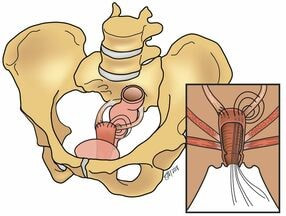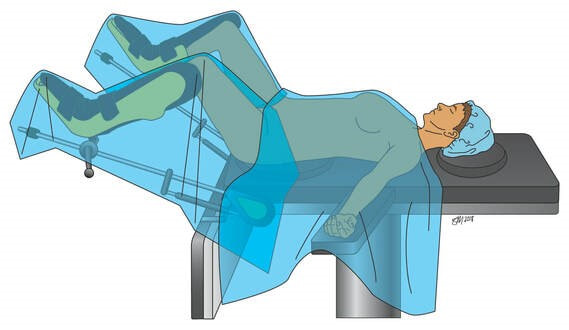Uterosacral Ligament Suspension
|
A uterosacral ligament suspension is a surgical procedure to restore the support of the top of the vagina after hysterectomy.
It can be performed at the same time as hysterectomy, or later on in life in women who have previously undergone a hysterectomy. In this surgery, the top of the vagina is sewn to the uterosacral ligaments (which are strong supportive structures that run between the bones of the pelvis and the sacrum), thereby restoring its support. Anatomically, the vagina is returned to its original position. This type of prolapse procedure is referred to as a “native tissue repair” as we are utilizing your own tissue to restore the support of the vagina. How Is the Surgery Performed? At Northwestern Medicine, your urogynecologist will perform the uterosacral ligament suspension via a minimally invasive surgical (MIS) route. The most common way to perform it is through the vagina; however, it can also be done utilizing conventional laparoscopy and the robotic surgical system. You and your urogynecologist will determine which MIS route is right for you. Regardless of the route you choose, the surgery will be performed under general anesthesia with an anesthesiologist monitoring your heart and lung function throughout the surgery. If you are having a hysterectomy performed, your urogynecologist will perform this first. After this, the top part of your vagina is sewn to the ligaments using both permanent and delayed-absorbable stitches. Oftentimes, this surgery is performed at the same time as an incontinence surgery to treat urinary incontinence. How Successful Is This Surgery?
Most women are satisfied with their symptom control following this surgery. Unfortunately, native tissue prolapse repairs do carry a risk of the development of recurrent prolapse. Approximately 30 percent of women undergoing this surgery will develop recurrent prolapse which might prompt further conservative or surgical management treatment options. Are There Complications?
This surgery has been extensively studied, thus the complications are very well known. As with any surgery, there is a risk of bleeding and hematoma formation. This is very rare and usually does not require a blood transfusion. There is also a small risk of vaginal or bladder infections after this procedure. If you develop vaginal discharge that is foul-smelling or symptoms of a urinary tract infection (urgency, frequency, pain with urination), you should let your urogynecologist know. Very rare risks of this surgery include injury to the nearby organs, nerves, muscles, or ligaments. Buttock pain from the attachment of the vagina to the ligaments or pain with intercourse can rarely occur. Generally, this can be treated with pelvic floor physical therapy and scar tissue release. What Is the Recovery? Since your urogynecologist is able to perform this surgery utilizing a minimally invasive approach, you will most likely be able to go home the day of surgery. To help you accomplish this goal, we have worked with our anesthesiology team to develop an Enhanced Recovery After Surgery (ERAS) program. Your urogynecologist will determine if you are a candidate for this program at your pre-surgical visit. We also appreciate that you are undergoing surgery to restore your quality of life, and thus we would like to get you doing the things you want to do as quickly as possible postoperatively. We ask you to abstain from sexual intercourse for at least six weeks while your stitches in your vagina are healing. Otherwise, you can return to your normal activities as soon as you feel ready. How Should I Prepare for Surgery? You will meet with your surgeon as well as our nurse preoperatively to discuss specific instructions to follow before and after surgery. About Vaginal Surgeries Vaginal surgeries are minimally invasive procedures that require no incisions in the abdomen because access to all of the pelvic organs is obtained using incisions in the vagina. For these procedures, patients are positioned on their backs with legs and feet in supportive stirrups. Other vaginal surgeries include: |
To Request an Appointment
If you're suffering from a pelvic floor disorder, you don't have to live with the symptoms. To learn about treatment options, call 312.694.7337 to schedule an appointment with one of our urogynecologists. Other Vaginal Surgeries for Pelvic Organ Prolapse
MEET OUR TEAM
Our transdisciplinary team works together to ensure that each patient receives a tailored and highly individualized plan of care. |





